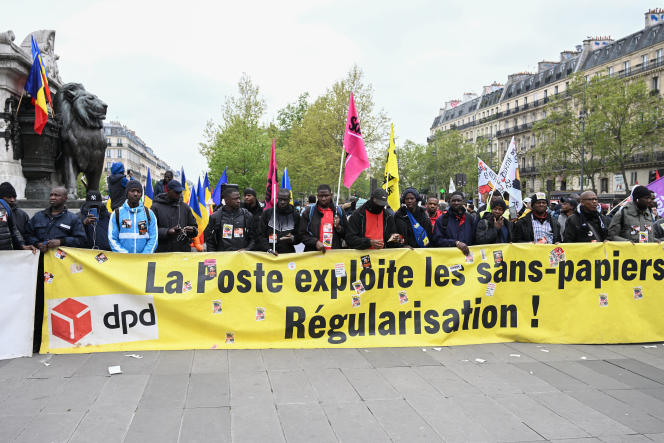There are around ten of them, Tuesday September 19, in front of the Paris court, behind a banner in the colors of the SUD-PTT union. Most are undocumented, but employed, through temporary work companies, by subsidiaries of the La Poste group, such as Chronopost or Derichebourg, to sort parcels in warehouses or deliver them.
According to the unions and their collectives, they are most often entrusted with difficult tasks and thankless schedules. A situation known for years within La Poste, where several strike movements have already sought to raise awareness about the situation of these workers, while the unions accuse the group, like other important French companies, of ” turn a blind eye” to the practices that take place in its subsidiaries.
However, since March 27, 2017, there has been a law which establishes for these large groups a “duty of vigilance”, which requires them to publish each year a document detailing the human and environmental risks of their activities, also including their subcontractors. This is the basis of this text – a “new question, which has earned us a certain success”, smiles the president of the first civil chamber, facing the packed court room – that SUD-PTT has summoned the La Poste group before the Paris judicial court.
The union believes that the vigilance plan published each year by the group does not meet the legal obligations imposed by the 2017 law. According to SUD-PTT, it does not include exhaustively the “risk mapping and serious harm” human rights, health and safety; no more than the list of group subcontractors.
” Trial of intent “
“Vigilance means avoiding the realization of a danger, a notion which goes beyond the obligation of prudence”, pleads Me Céline Gagey, SUD-PTT advisor. For her, “the exploitation of undocumented immigrants [par les filiales du groupe] is a business model to which La Poste turns a blind eye”, only taking measures when faced with a massive mobilization of employees, which contravenes its duties. This trial “is not that of subcontracting, but that of breaches of duties of vigilance” of the public group, which “as a parent company, must take action” against these abuses, “even if they take place via the temporary agency of the subcontractor of the subcontractor”. Measures which, explains the lawyer, involve much stricter control of the practices of the group’s subsidiaries, which does not appear in the famous document. Me Gagey estimates that only 1% of the group’s subcontractors have experienced a “on-site audit” since 2017.
You have 40.26% of this article left to read. The rest is reserved for subscribers.
